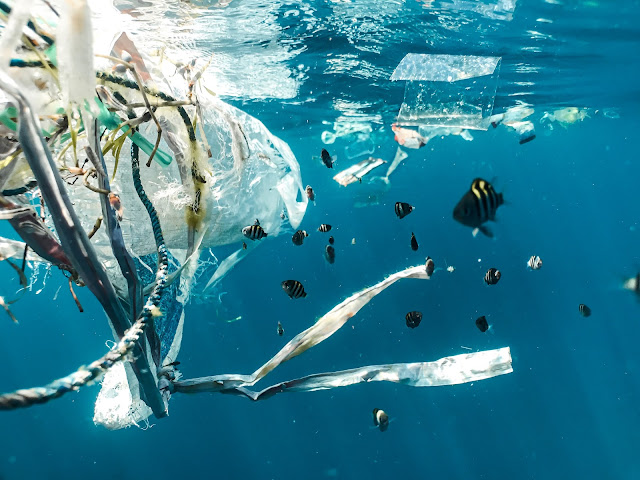Zero Waste Challenge
Don't you hate walking through a park and seeing garbage on the ground? Or garbage tossed along the highway? Is there anything uglier?
Well actually, yes there is. The plastic soup that infiltrates gigantic areas of our oceans, chokes marine life, and allows toxins to enter the food chain is a problem on par with global warming.
The #1 way to reduce waste
Both manufacturing and waste disposal put a strain on the environment. Even recycling uses resources and causes pollution, but alarmingly, the vast majority of plastic is never recycled. Much of it enters our waterways. It may be used for only a few hours (or a few minutes!), but it takes hundreds of years to decompose.
One way to begin to address this problem is simply to reduce waste. Obviously, this change isn't made overnight. It's a goal we can work toward, and minimalism can help.
The absolute best way to reduce waste is to buy less in the first place. Minimalism encourages us to live with only what we need, which means we shop and consume less than our average fellow citizen. It's not perfect, but it's a start.
30 additional ways to waste less
1. Value quality over quantity in every single purchase. Keep items longer, care for them, and repair them so you can replace them less often.
2. Replace plastic shopping bags with reusable totes, not only at the grocery store, but everywhere you shop.
* This blog is reader-supported. If you purchase through my links, I may earn a small commission at no cost to you.
3. Replace plastic produce bags with reusable mesh bags.
4. Opt for items with minimal packaging. Avoid snack packs and individually wrapped products. Buy pantry items from bulk bins when possible, and be sure to bring your own reusable storage containers. Support brands that avoid excessive packaging.
5. Buy food more consciously to avoid waste. Each year, we discard millions of tons of expired food while millions of people go hungry. Avoid buying economy sizes if you're unlikely to use them, and shop every few days for immediate needs, rather than stockpiling. Serve smaller portions that will actually be consumed, and compost as many food scraps as possible.
6. Replace plastic wrap or paper lunch bags with a bento box or reusable snack and sandwich bags.
7. Replace plastic straws with a stainless steel straw, or simply do without.
8. Avoid fast food, with its disposable cups, lids, and plastic utensils and containers. Eat at home or in a restaurant that uses real plates, cups, and silverware.
9. Avoid Styrofoam and plastic takeout containers. Bring some of your own storage containers to the restaurant.
10. Replace plastic utensils with the real thing, even on picnics.
11. Avoid using disposable cups, lids, and sleeves at your coffee shop by asking the barista to prepare and serve your latte in a mug. I'm always sorry to see the predominance of takeaway cups used by people who have stayed in the store.
12. Avoid making coffee with single-use pods, and use a drip machine or a pour-over setup instead. Use a stainless steel filter instead of paper.
13. Replace tea bags with a stainless steel strainer and loose leaf tea packed in a tin.
14. Avoid bottled water. Fill a reusable bottle from the tap.
15. Replace paper towels with cloth to wipe up spills.
16. Avoid plastic sponges. Use washable dish cloths, and change them daily.
17. Replace paper napkins with cloth napkins.
18. Replace paper baking cups with silicone cups.
19. Instead of a throwaway razor, shave with an electric razor or a reusable one with replaceable blades.
20. Replace plastic toothbrushes with bamboo toothbrushes that can be composted.
21. Use smaller amounts of shampoo, facial cleanser, and other personal care products. You'll find that less is still enough for the job, and you'll save money while going through fewer containers.
22. Consider using disposable diapers and wipes only when traveling, while using cloth diapers and wipes at home. I know it's a big commitment, but earlier generations managed it without washing machines and tumble dryers.
24. Consider using facial tissues only when you're sick, and a handkerchief the rest of the time.
25. Replace dryer sheets with wool dryer balls.
26. Use refilled ink cartridges in your printer, and print only when absolutely necessary.
27. Use refillable pens and mechanical pencils.
28. Invest in rechargeable batteries.
29. Reuse paper gift wrap and bags, or present your gift in a small cloth tote.
30. Choose glitter-free paper items and makeup. Glitter is a microplastic that is dangerous to sea life.
Full disclosure: I don't practice all of these suggestions, but I'm working toward that goal.
Why not pick a disposable item you use regularly and replace it with a reusable version? Practice for several weeks until it becomes a habit. Then choose another item and go on from there.
Updated February 2023






thnks
ReplyDelete